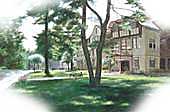Summer
1987
They That Thrust Men
Tom Worth
"And from the days of John the Baptist until now, the
kingdom of heaven suffereth violence and the violent take
it by force" Matthew 11:12.
Thus Jesus describes the awakened hopes and the eager thronging
of the multitudes after John's clear cry in the wilderness
cut through the religious, political and social fog of that
time. John directs men's attention to the approaching kingdom
of God and especially the King of that kingdom. The excitement
of those early days, full of the promise of all that Israel
had longed for drove men to meet and hear the Man from Galilee.
The pushing and shoving, the jostling of one another, the
eagerness and excitement all motivated by consuming spiritual
hunger and heartbreaking human need are brought out more clearly
by another rendering of the same verse of scripture.
"And from the days of John the Baptist until now, the
kingdom of heaven is gotten by force and they that thrust
men take it by force" Matthew 11:12Margin.
The phrase, "they that thrust men," is an apt
description. One can readily picture the crowds and those
individuals in the crowds who would not be hindered in their
effort to get to Jesus. The woman with the issue of blood
is an example. She thrust her way through the crowd until
she touched the hem of Christ's garment and was made whole.
How about today's situation? Do we still need to thrust
men? What sort of "violence" is it that takes the
kingdom of heaven? Certainly God has not called us to be religious
bullies, rude, insensitive, selfish, etc. We all have unpleasant
memories of being shoved aside by someone who had little care
for us. Yet there is a "violence" that wins the
kingdom of heaven in our day, and like those hungry hearts
in the gospels, it is found in those who simple will not let
anyone hinder them from coming to Jesus.
We still need to "thrust men." In other words,
no one should come between us and the Lord. Many times we
have heard this excuse, "I won't become a Christian because
they're all hypocrites," or "I won't go to church
because they're hypocrites." Here is an example of how
the sinner has let the hypocritical behavior of some who name
the name of Christ get in the way between him and the Lord.
Those "hypocrites" are between him and the Lord
and he's content to let them stay there. He won't thrust them
out of the way.
Christians also suffer from failing to thrust men in a number
of ways: some will idolize a particular minister because they
are so pleased with him that he(in their thinking at least)
comes to stand between them and the Lord. Others, through
error, are made to feel the minister should stand between
them and the Lord and they let it happen out of a sense of
duty. Then disillusionment may come in either of these two
examples when the minister fails in some way and even that
failure can stand between them and the Lord. Ministerial failure
can also stand between Christians and the Lord even if neither
of the first two examples held true for them. How many people
have walked away from the Lord because someone offended them?
They let the offences of others crowd them away from the Lord.
In all of these cases, Christians failed to thrust men andf
ailed to take the kingdom.
The above examples are just a few in the vast multitude
that we need to thrust our way through. Even more numerous
are effects from the influences of friends, peers, relatives,
associates, employers, employees, the makers of opinion in
the mass media, singers and songwriters, actors and scriptwriters,
teachers, students, parents, children, husbands, wives, girlfriends,
boyfriends, buyers, sellers, writers, advertisers, the owners
of the dog next door, neighbors, doctors, nurses, patients,
and the list could go on and on. Each one of the categories
mentioned, and the thousands not mentioned, contain people
to which we need to relate rightly and in a right relationship
they don't come between us and the Lord. We need to love,
honor or respect, as the case may require, but when it comes
to our relationship with the King of Heaven's kingdom, the
Lord Jesus, no one should come between us and Him, either
by their design or ours. We need to thrust men. That means
we submit, we cooperate, we consider others better than ourselves
but above all we consider the Lord. We "thrust men"
when we forgive them. When we forgive them, they nolonger
stand between us and the Lord. We "thrust men" when
we accept them and not make more or less of them than they
really are. We "thrust men" when were fuse to be
seduced by fast talk, flattery, impressive arguments, public
acclaim, position and so on.
And this leads us to the final man we need to thrust, ourselves.
We "thrust men" when we refuse to use them for our
own ends and in that refusal we really thrust the final man,
the self. Walt Kelly, in a marvelous parody of Commodore Perry's
victory dispatch, makes his comic strip character Pogo say,
"We has met the enemy and it is us!" In taking the
kingdom by force, in thrusting all these other men out of
our way, if we do it rightly, we thrust ourselves out of our
way as well. As the Lord said, "If any man will come
after me, let him deny himself. . ." Matthew 16:24. In
coming to Jesus, we must not let self stand in the way. We
come to Him, not with what we shall tell Him to do, but with
an openness to what He shall tell us to do. After all, we
are coming to the King.
When we come to Jesus we need to truly deny self. Much religious
exercise, asceticism, and much of what has been called self
denial can become self-exaltation. How ironic that many who
think they are exercising self denial come into a vicious
cycle of pride and condemnation where self is confirmed instead
of denied because that false self denial depends on the self!
The false self denial says that we come to Christ by our own
efforts. The real self denial denies any value in the self
to bring us to God but instead on the blood of Jesus and the
mercy of God. When we trust in Jesus instead of self, we deny
self and "thrust" that man out of the way.
The kingdom of heaven suffers only the violence of the faith
that works by love. Those who have been amazed by the grace
of God see a beauty in the face of Jesus that they will let
nothing obscure. The kingdom of heaven suffereth violence
and they that thrust men take it by the strongest force of
all, the love of God in Christ.


